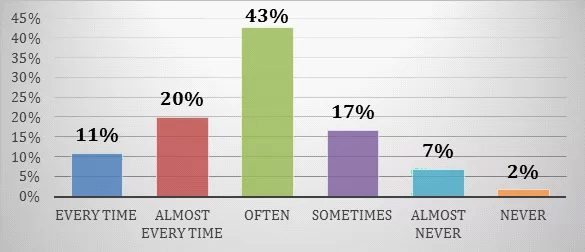After 10 years, GIs still not getting it right either

A recent nationwide study of medical and surgical trainees — including those who perform colonoscopies — found they have poor knowledge of colorectal cancer (CRC) screening and surveillance guidelines. Their knowledge was assessed in a survey that tested their ability to identify factors utilized by the guidelines for screening and surveillance recommendations and to correctly answer clinical vignettes.
Advertisement
Cleveland Clinic is a non-profit academic medical center. Advertising on our site helps support our mission. We do not endorse non-Cleveland Clinic products or services. Policy
The 16-question, web-based survey was sent by email to medical trainees in Accreditation for Graduate Medical Education-(ACGME) approved programs: internal medicine, family practice, ob-gyn, urology, general surgery, gastroenterology and colorectal surgery. Overall, 397 non-colonoscopist primary care and 178 colonoscopist trainees responded.
Of the 586 trainees surveyed, 10 percent of those who perform colonoscopy and 22 percent of their non-colonoscopist peers correctly answered two identified factors — such as age and family history — that determine the guideline’s screening intervals. Additionally only 29 percent and 0.25 percent respectively were able to correctly answer two surveillance vignettes and identify factors — such as polyp size and pathology — that determine surveillance recommendations.
The results were surprising, says Carol A. Burke, MD, Vice Chair, Cleveland Clinic Department of Gastroenterology and Hepatology, and one of the investigators involved in the research, which was done in collaboration with Cleveland Clinic residents Rushad Patell, MD, and Abhishek Karwa, MD.
Earlier studies found practicing physicians did not display accurate knowledge of guidelines for CRC screening and surveillance. However, because trainees are in the midst of learning and practicing evidenced-based care, the researchers hypothesized they would perform better, particularly those performing colonoscopy. “Yet, their responses were just as inaccurate as the physicians in practice,” Dr. Burke says.
Advertisement
The findings were presented at the American College of Gastroenterology 2016 Annual Scientific Meeting and Graduate Course in Las Vegas.
Despite their mediocre scores, the colonoscopist trainees believed they had strong knowledge of the guidelines: 75 percent said they felt confident recollecting the screening guidelines and 85 percent said they felt confident remembering the surveillance guidelines.
“When you take a look at confidence numbers, it’s the gastroenterologists who are uber-confident,” Dr. Burke says. “But when you look at the accuracy of their answers, it was substantially lower in most domains than in their peers — who fared poorly, too.”
The researchers also performed a study on the use of mobile technology by gastroenterologists and medical and surgical trainees in the medical workplace. They found 99 percent of the 698 respondents owned a smartphone and 74 percent indicated they frequently used it for clinical care — though it was the medical trainees who used it more often, 77 percent versus 45 percent.

Study on the use of mobile technology by gastroenterologists and medical and surgical trainees in the medical workplace.
Overall, 85 percent reported interest in utilizing a mobile app to aid in counseling their patients on appropriate CRC screening and surveillance recommendations. Nearly 25 percent of respondents indicated they would be willing to pay $5 or more for such an app.
These results convinced the researchers to team up with Cleveland Clinic Innovations to devise an app that can work at point-of-service with patients. “With the (electronic medical) records at their fingertips, physicians will be able to enter in the app the patient’s age, personal or family history and polyp data,” says Dr. Burke. “And it will generate the national recommendations.”
Advertisement
Finding a way to increase proper use of the guidelines is important, she says, because studies have shown that proper screening and surveillance can decrease both the incidence and the mortality related to CRC.
Dr. Burke says the team will perform follow-up studies once the app has been created. Previous studies were done when the guidelines were two and five years old. “Now we’re a decade out and physicians counseling patients on colonoscopy intervals are still not getting it right,” she says. “So once doctors have easy to access to these mobile tools, we’ll want to see, if the tools have changed physician’s behavior.”
Advertisement
Advertisement

First-of-its-kind research investigates the viability of standard screening to reduce the burden of late-stage cancer diagnoses

Global R&D efforts expanding first-line and relapse therapy options for patients

Study demonstrates ability to reduce patients’ reliance on phlebotomies to stabilize hematocrit levels

A case study on the value of access to novel therapies through clinical trials

Findings highlight an association between obesity and an increased incidence of moderate-severe disease

Cleveland Clinic Cancer Institute takes multi-faceted approach to increasing clinical trial access 23456

Key learnings from DESTINY trials

Overall survival in patients treated since 2008 is nearly 20% higher than in earlier patients